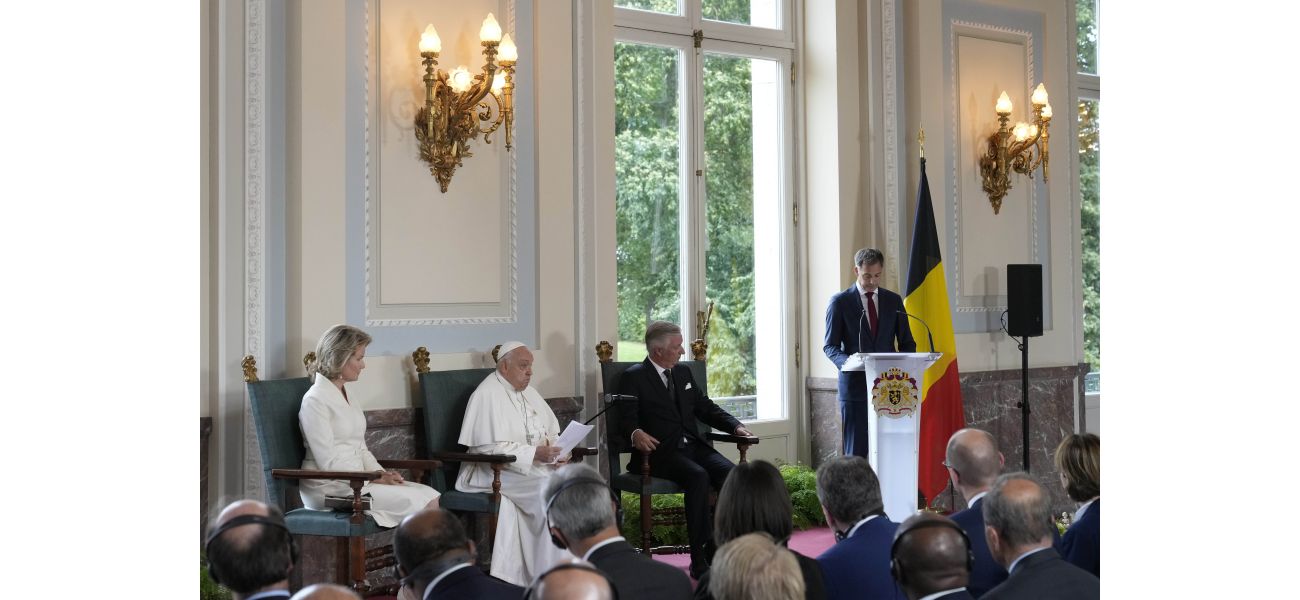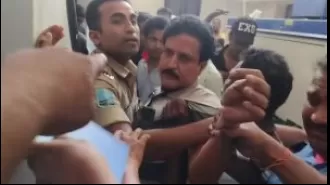Belgian leaders confront Pope over church's sex abuse cover-up.
Belgium's PM confronts Pope Francis for Church's history of sex abuse and cover-ups, calls for transparency.
September 27th 2024.

The Prime Minister of Belgium did not hold back when he addressed Pope Francis during his visit to the country on Friday. In a powerful and scathing speech, Alexander De Croo called out the Catholic Church for its history of sexual abuse and cover-ups, demanding that concrete actions be taken to acknowledge and address the pain and suffering of victims.
This was a bold move, as diplomatic protocol usually dictates that public remarks during official visits remain respectful and polite. Even King Philippe had strong words for the pope, urging the church to make amends and prioritize the healing of victims.
The fact that both the prime minister and the king spoke out so forcefully highlights the gravity of the abuse scandal in Belgium. The country has been reeling from the revelations of abuse and cover-ups for over two decades, which have severely damaged the credibility of the church and led to a decline in Catholicism and its influence.
Despite the tense atmosphere, Francis was applauded at the end of De Croo's speech and was expected to meet with abuse survivors in private later that day. In his impromptu response, the pope acknowledged the shame and humiliation of the church and emphasized the need for concrete steps to address the issue.
De Croo's speech was a direct call for accountability and justice for victims. He stressed the importance of listening to survivors and recognizing the harm that has been done. He also made it clear that cover-ups and brushing things under the rug will no longer be tolerated if the church wishes to move forward.
Overall, victims welcomed the strong words from both the prime minister and the king. Emmanuel Henckens, a survivor of abuse, felt that they had finally touched upon the root of the problem and that it was time for the church to face the truth.
However, Koen Van Sumere, another survivor, emphasized the need for the church to go beyond just words and take concrete actions to provide reparations for victims. He called for a universal system of reparations to be put in place, an idea that the Vatican has been hesitant to consider as they prefer to handle financial settlements with victims on a local level.
Van Sumere stressed that apologies are not enough and that the church must take responsibility for the harm it has caused and compensate victims accordingly. He shared that the amount he had received for his abuse barely covered the cost of his therapy and that the church's previous payouts were nothing more than token gestures.
The abuse scandal in Belgium has been unfolding for over 25 years, with shocking revelations coming to light from time to time. In 2010, the country was rocked by the revelation that Bruges Bishop Roger Vangheluwe had been allowed to resign without any punishment after admitting to sexually abusing his nephew for 13 years. It wasn't until earlier this year that Francis finally defrocked him.
The scandal resurfaced last year with the release of a documentary that featured interviews with Belgian victims of abuse. This was the first time that survivors had spoken publicly about their experiences, shedding light on the widespread and systematic cover-up of abuse by the Catholic hierarchy.
Interestingly, both the king and the prime minister made their strongest remarks about abuse in Dutch, the language spoken in Flanders where most of the abuse cases have come to light. This further emphasizes the magnitude of the issue in that particular region.
De Croo's speech was also a break from traditional Vatican protocol, as it is usually only the king who addresses the pope during official visits. However, as was the case in Canada when Prime Minister Justin Trudeau addressed the pope alongside the governor-general, De Croo's office had requested to speak.
In his response, Francis acknowledged the efforts being made by the church to address the issue, such as implementing prevention programs and supporting victims in their healing process. However, after the powerful speeches by the prime minister and the king, the pope went off-script to express the church's shame and commitment to ending the abuse and cover-ups.
He stressed the need for the church to take responsibility and make sure that such atrocities never happen again. However, for many victims, this is not enough. They are demanding more than just apologies and words; they want the church to take concrete actions to provide reparations and support for their lifelong healing.
The issue of forced adoptions in Belgium, which has recently come to light, was also addressed by the pope, who expressed his sadness and condemned the criminality of such practices. He acknowledged that this was a widespread issue in society at the time, but it is something that the church must take responsibility for and apologize for, just as he did in the case of Ireland's forced adoptions.
The pope's understanding of this issue is rooted in his own country's history of forced adoptions during the military dictatorship in Argentina in the 1970s. This is an issue that he has addressed before, and it is clear that he is committed to taking concrete steps to address and prevent such atrocities from happening in the future.
This was a bold move, as diplomatic protocol usually dictates that public remarks during official visits remain respectful and polite. Even King Philippe had strong words for the pope, urging the church to make amends and prioritize the healing of victims.
The fact that both the prime minister and the king spoke out so forcefully highlights the gravity of the abuse scandal in Belgium. The country has been reeling from the revelations of abuse and cover-ups for over two decades, which have severely damaged the credibility of the church and led to a decline in Catholicism and its influence.
Despite the tense atmosphere, Francis was applauded at the end of De Croo's speech and was expected to meet with abuse survivors in private later that day. In his impromptu response, the pope acknowledged the shame and humiliation of the church and emphasized the need for concrete steps to address the issue.
De Croo's speech was a direct call for accountability and justice for victims. He stressed the importance of listening to survivors and recognizing the harm that has been done. He also made it clear that cover-ups and brushing things under the rug will no longer be tolerated if the church wishes to move forward.
Overall, victims welcomed the strong words from both the prime minister and the king. Emmanuel Henckens, a survivor of abuse, felt that they had finally touched upon the root of the problem and that it was time for the church to face the truth.
However, Koen Van Sumere, another survivor, emphasized the need for the church to go beyond just words and take concrete actions to provide reparations for victims. He called for a universal system of reparations to be put in place, an idea that the Vatican has been hesitant to consider as they prefer to handle financial settlements with victims on a local level.
Van Sumere stressed that apologies are not enough and that the church must take responsibility for the harm it has caused and compensate victims accordingly. He shared that the amount he had received for his abuse barely covered the cost of his therapy and that the church's previous payouts were nothing more than token gestures.
The abuse scandal in Belgium has been unfolding for over 25 years, with shocking revelations coming to light from time to time. In 2010, the country was rocked by the revelation that Bruges Bishop Roger Vangheluwe had been allowed to resign without any punishment after admitting to sexually abusing his nephew for 13 years. It wasn't until earlier this year that Francis finally defrocked him.
The scandal resurfaced last year with the release of a documentary that featured interviews with Belgian victims of abuse. This was the first time that survivors had spoken publicly about their experiences, shedding light on the widespread and systematic cover-up of abuse by the Catholic hierarchy.
Interestingly, both the king and the prime minister made their strongest remarks about abuse in Dutch, the language spoken in Flanders where most of the abuse cases have come to light. This further emphasizes the magnitude of the issue in that particular region.
De Croo's speech was also a break from traditional Vatican protocol, as it is usually only the king who addresses the pope during official visits. However, as was the case in Canada when Prime Minister Justin Trudeau addressed the pope alongside the governor-general, De Croo's office had requested to speak.
In his response, Francis acknowledged the efforts being made by the church to address the issue, such as implementing prevention programs and supporting victims in their healing process. However, after the powerful speeches by the prime minister and the king, the pope went off-script to express the church's shame and commitment to ending the abuse and cover-ups.
He stressed the need for the church to take responsibility and make sure that such atrocities never happen again. However, for many victims, this is not enough. They are demanding more than just apologies and words; they want the church to take concrete actions to provide reparations and support for their lifelong healing.
The issue of forced adoptions in Belgium, which has recently come to light, was also addressed by the pope, who expressed his sadness and condemned the criminality of such practices. He acknowledged that this was a widespread issue in society at the time, but it is something that the church must take responsibility for and apologize for, just as he did in the case of Ireland's forced adoptions.
The pope's understanding of this issue is rooted in his own country's history of forced adoptions during the military dictatorship in Argentina in the 1970s. This is an issue that he has addressed before, and it is clear that he is committed to taking concrete steps to address and prevent such atrocities from happening in the future.
[This article has been trending online recently and has been generated with AI. Your feed is customized.]
[Generative AI is experimental.]
0
0
Submit Comment





